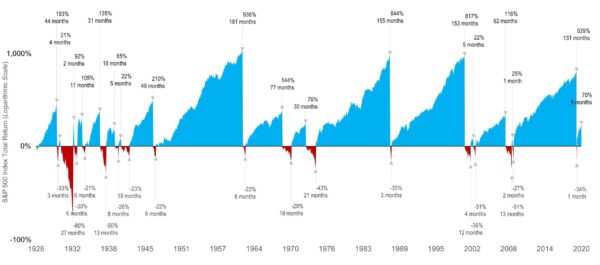
In this post, Dimensional Fund Advisors offers their perspective on the long-term benefits of stock investing. While stock returns are volatile, nearly a century of bull and bear markets shows that the good times have outshined the bad times.
A History of Market Ups and Downs
S&P 500 Index total returns in USD, January 1926–December 2020
Using a 20% threshold for downturns
Key Takeaways
- From 1926 through 2020, the S&P 500 Index experienced 17 bear markets, or a fall of at least 20% from a previous peak. The declines ranged from —21% to —80% across an average length of around 10 months.
- On the upside, there were 18 bull markets, or gains of at least 20% from a previous trough. They averaged 54 months in length, and advances ranged from 21% to 936%.
- When the bull and bear markets are viewed together, it’s clear equities have rewarded disciplined investors.
The stock market’s ups and downs are unpredictable, but history supports an expectation of positive returns over the long term.
For the best shot at the benefits the market can offer, stay the course.
FOOTNOTES:
Past performance is no guarantee of future results. Indices are not available for direct investment; therefore, their performance does not reflect the expenses associated with the management of an actual portfolio.
In USD. Chart end date is December 31, 2020, the last trough to peak return of 70% represents the return through December 2020. Due to availability of data, monthly returns are used January 1926 through December 1989; daily returns are used January 1990 through present. Periods in which cumulative return from peak is –20% or lower and a recovery of 20% from trough has not yet occurred are considered Bear markets. Bull markets are subsequent rises following the bear market trough through the next recovery of at least 20%. The chart shows bear markets and bull markets, the number of months they lasted and the associated cumulative performance for each market period. Results for different time periods could differ from the results shown. A logarithmic scale is a nonlinear scale in which the numbers shown are a set distance along the axis and the increments are a power, or logarithm, of a base number. This allows data over a wide range of values to be displayed in a condensed way.
Source: S&P data © 2021 S&P Dow Jones Indices LLC, a division of S&P Global. All rights reserved.
Dimensional Fund Advisors LP is an investment advisor registered with the Securities and Exchange Commission.
